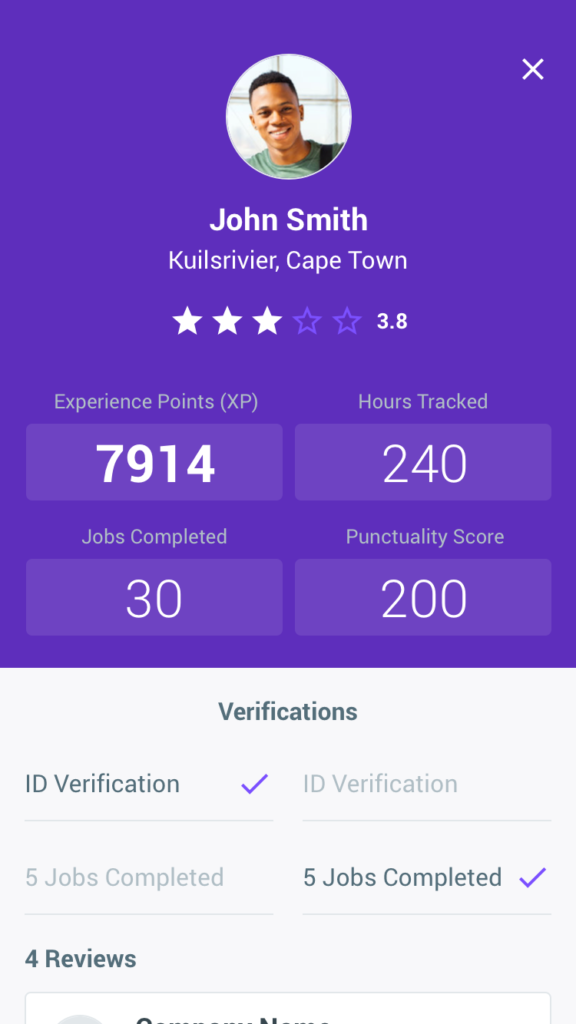Seeking the documents you need to get a job can be difficult. However, to increase your chances of finding work, you need to be able to supply what the employer needs. See this full manual and refer to it to find out about sourcing absolutely any document you need to get a job.
ID
Obtaining an ID
You will more than likely have an ID card or certificate which demonstrates to authorities who you are as a South African citizen. If you are not a South African citizen, refer to section (6) which tells you how to obtain a work permit.
If you currently do not have a copy of your ID, you will need to apply for one at Home Affairs. As well as needing an ID to get a job, you will need an ID to register for your matric exams, get a driving license and get a bank account.
Identity documents are issued to South African citizens or permanent residence permit holders who are 16 years or older.
You can apply for your ID book at any office of the Department of Home Affairs or any South African mission or consulate overseas. All applications are sent to the Department’s head office in Pretoria. There, your fingerprints will be matched with those already on record or entered into the National Population Register. Your application will then be processed and once issued, your ID book will be forwarded to the office where you made your application for you to collect.
You must provide your cellphone number in your application so that you can receive regular updates on the progress of your application by SMS. To get the SMS updates, simply SMS the word “ID” followed by your ID number to 32551. You will be charged R1 for each SMS sent.
If you require any further information, please refer to this page produced by the Department of Home Affairs.
Obtaining a Certified ID
You can have copies of original documents certified at any police station, at any time. Make sure you find out where your nearest police station is and sometimes it is best to give them a call so they know you are coming. Once this process is complete, your ID will be fully certified. For more information, visit this page produced by The South African Police Service.
Certificates of Qualifications
Employers will often ask you for school certificates as proof of a qualification that you have obtained. Normally you will be issued this by your institution when you are awarded with the qualification, however sometimes this may get lost or stolen.
If, unfortunately, your certificate has been misplaced, the best way to get another one is to contact your institution. They will always keep a record of your qualification electronically, and will either be able to send it to you via post or email. You will probably need to demonstrate who you are by providing a copy of your ID. You can find out more about this in section (3) – Certification of ID. Once you receive the new certificate, try to keep a copy of it electronically so that there is less chance of it getting lost or stolen.
Sometimes employers will request that your certificates are certified to prove that they are legitimate. South African Qualifications Authority (SAQA) offer a service which allows you verify your certificates. You can visit the page and contact them here.
Proof of Address
A document which proves your address can often be difficult to source especially if you don’t have a bank account. However, there are a few simple ways that you can get one, which are outlined below.
In association with the Financial Intelligence Centre Act 38 of 2001 (FICA), the following documents are accepted to verify a physical address:
- A utility bill, such as water, electricity or rates (less than 3 months) We may accept a utility bill that are addressed to a post box number if it shows your name, erf/stand number, township and suburb
- A bank statement or financial statement from a financial institution (less than 3 months old)
- A copy of a signed lease agreement (by both parties), (less than 1 year old)
- A municipal rates and taxes invoice (less than 3 months old)
- A mortgage statement from another financial institution, (less than 6 months old)
- A telephone account, ie. a land–line or cellphone account (less than 3 months old)
- An official tax return/tax assessment (less than 1 year old)
- Official correspondence from the South African Revenue Services (“SARS”) (less than 3 months old)
- A recent life insurance policy issued by an insurance company
- Correspondence from a body corporate or share–block association (less than 3 months old)
- A valid television license document
- A recent short–term insurance policy document or a short–term insurance renewal letter (less than 1 year old)
- A retail account statement/invoice (less than 3 months old)
- Where the person live in any type of residence (eg. hostel/barracks) a letter from the administration department of such residence on an official letterhead
Remember that these documents must have your name on them and not the name of a friend or family member.
If you hold a Bank Account, then this is often the easiest way of providing a proof of address. Visit the nearest bank of which you hold an account and they will print a proof of address out for you. Remember to take your ID with you when you do so.
CV
A CV stands for Curriculum Vitae, and although it is not an official document, employers will regularly ask that you provide a CV to demonstrate your previous qualifications and achievements. A CV can be an extremely valuable way if differentiating yourself from other candidates. Follow this EMPLOYABLE acronym below when designing your CV to make sure you produce a document which is easy to read and professional.
Easy to read – Many people overcomplicate their CV. Ensure that you clearly structure information so that key things that you want the employer to see can easily stand out.
Make an impression – Employers have to filter through a ton of CVs before they see yours. Therefore, make sure you add a little twist or something a bit different so that they can identify yours easily.
Professional picture – ALWAYS include a picture of yourself in your CV. This makes employers relate to you. Furthermore, make sure the image is professional, and hasn’t been taken on your last drunken night out!
Leadership attributes – Even if you’re not going for a leadership role, demonstrate that you have leadership skills and can work well with others. A good way of demonstrating this is to use an example of when you once handled one of these situations well.
Obtain advice – Speak to people within your field, or others in your situation. Everyone has a story to tell, and you can trade off tips to better each other.
You’re the one for the job – Believe in yourself! Trust that by putting the right foundations in place, you will be the person who is selected for the role.
Accurate spelling – Grammatical mistakes are the first thing that will result in a CV being thrown in the bin. Therefore, make sure you thoroughly check your spelling and grammar before sending your CV out to a prospective employer.
Be Creative – Think of a really interesting way you can stand out. I once saw a CV that had a picture of a box, and all the text was around it. This demonstrated that the candidate was, no pun intended, ‘thinking outside the box’. These are the sorts of things which really get you noticed.
Learn to Interview well – It is crucial that you have a strong CV in order to get to the interview stage. However, interviewing well will get you past the finish line. See our article on interviews for more tips.
Educate yourself – Always look to better yourself by enrolling in free courses and surrounding yourself with experienced people. Remember, although its partially about constructing a good CV, it’s the content that’s on it which really counts.
Tax Number
Some companies will be able to obtain this for you however in other cases, it is good for you to source a Tax Number yourself.
A tax number along with official documentation from SARS will often be required before you are able to commence work with a registered employer.
You might be unsure whether you have a tax number or not. The best way to solve this is to call SARS on 0800 00 7277 and they will check for you. Make sure you have your ID present when you make this phone call. Your tax number will be a 10-digit number.
Obtaining a Tax Number
Previously SARS allowed tax payers to download and complete an IT77 tax payer registration form then send it to SARS to register. The process has since changed. Now all tax payers are required to visit SARS in person with the documents below.
Take the following documents to your nearest SARS branch to register as a tax payer: You can find out where your nearest SARS branch is here.
- A certified legible copy of your ID, passport or drivers license. Certification of copied documents can be done at your nearest police station (just remember to take the original along too). If you need more information about obtaining a certified copy of your ID, refer to (3) – Certification of ID
- Proof of address (this can be a rates bill, utilities bill, phone bill, bank statement etc – anything that shows your name and your address on an official letterhead). If you need more information about obtaining your proof of address, refer to (5) – Proof of Address.
- 3 months banks statements, original and stamped by the bank. Refer to (8) – Bank accounts.
You may receive your tax number by post some time after your in-branch registration in the form of an IT150 / Notification of registration (see below). If you would like to call SARS (0800 00 7277) to find out what the current status of your registration is, remember to have your ID number with you for the call.
Once you obtain your Tax Number and document from SARS, remember to keep it in a safe place for future reference. If you require any further information, visit this page by TaxTim for more information.
Bank Accounts
Most employers will request that you have a bank account when you commence work, because they prefer to pay electronically rather than in cash. Having a bank account will also assist you with obtaining the other documents you require when looking for a job.
The best way to open a bank account is to visit your nearest branch. Some banks will offer different incentives to bank with them, but make sure you do your research before choosing who to bank with as some banks might offer more than others.
Opening a Bank Account
Banks have to follow the regulations set by The Financial Intelligence Centre Act (FICA) when they are opening a bank account for you. FICA specify that two documents are required in order to open an account:
- Original Identification Document. For more information, see (3) – ID
- Proof of residential address document. For more information, see (5) – Proof of Address
FICA requires that all client information be correct and up to date. It is therefore important that you notify them of any changes to your identity or residential address details. Visit your nearest branch with your identification document and original proof of residential address to update your details.
If you require any further information about opening a bank account, visit this page issued by Capitec Bank.
Police Clearance
Employers will often want to confirm that you do not have a criminal record and will therefore require a police clearance. Some companies will be able to obtain this for you however in other cases, it is good for you to source it yourself.
Below are the steps you need to follow in order to obtain a valid police clearance.
- Attend your nearest police station and ask to take a full set of fingerprints.
- Fill out the fingerprint form which includes information about your full name, surname, date of birth and identity number. A copy of your identity number/passport must also accompany the application.
- The police station where you apply will send your completed application to the Criminal Record Centre. Alternatively, you can deliver the application in person or mail it to the address below:
The Head of the South African Criminal Record Centre
(For attention: Police Clearance Certificates)
Private Bag X308
0001 PRETORIA
SOUTH AFRICA
N.B. There is a cost of R96.00 for the application. However, it is popular that your employer will often refund you or pay for this. If not, speak to them first to see what the available options are.
If you require further information about obtaining a Police Clearance certificate, visit this page issued by The South African Police Service.






